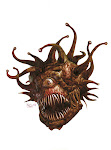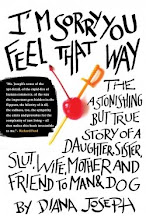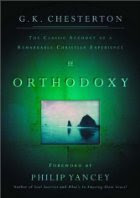I am agreeable to a fantastic story. Ten years I spent playing Dungeons & Dragons, among other role-playing games. Now I’m not too surprised about having gone on study stories in college (and if I had more time, I’d be playing those games in my spare hours). Dungeons & Dragons allows a small group to create individual characters who interact with a fictional world. It is, quite simply, world-building & characterization & plot development & narrative structure & willing suspension of disbelief all wrapped together in an ongoing storyline with numerous minor storylines branching off and back again over an extended period of time. Almost invariably I served as "game master." The world was my own. All things and creatures and personae and Gods and characters (except for the players’ characters) were my own. It is a living thing. It has voice and reason, myth and tales, heroes and dragons. It is a place of horrible violence where bad things happen to good people and good things happen to bad people. As it must necessarily be so. And, it was good practice.
Onward.
Have any of us read Orthodoxy by G.K. Chesterton? I am reading this book again (third or fourth time) because I feel my writing has stagnated. Oh I’m producing. I’m writing habitually. But something is stuck. Something in the writing isn’t moving. There is no reason to go out of my way (and out of my wits) to identify what that something is. These somethings happen to us all.
Anyhow. I won’t explain Orthodoxy or summarize it. (To do so would cheapen the experience of reading it for the first time.) Though I will leap into worthwhile passages that have helped me to understand more deeply the Process.
In "The Ethics of Elfland" Chesterton explains the difference between the Reasonable, Necessary logic of actions in actuality and the possibility of the same Reasonable, Necessary logic of actions in fairyland. He is explaining the relationship of what I call "Heart and Spine."
Spine: the structure of literal sense that is necessary for a reader to be able to read the story (analogous to Mathematics, or the Letter of the Law). Without Spine, the story cannot move; it is paralyzed. The narrative has no mobility, no legs to walk on, no arms to wave, no fingers with which to gesture. Without Spine, the processes necessary for a narrative body to do anything cannot happen.
Heart: the figurative and emotional sense that is necessary for a reader to be able to relate to the story (analogous to the Spirit of the Law). Without Heart, the story may as well be a technical schematic, a complex algebraic equation, a health insurance policy. Without Heart, the story lacks emotion as well as the means of carrying the weight of emotion through language.
"The test of fairyland [is] the test of the imagination" (69). For example: "The witch in a fairy tale says, ‘Blow the horn, and the ogre’s castle will fall’; but she does not say it as if it were something in which the effect obviously arose out of the cause. Doubtless she has given the advice to many champions, and has seen many castles fall, but she does not lose either her wonder or her reason. She does not muddle her head until it imagines a necessary mental connection between a horn and a falling tower."
In narrative, Heart embodies mystery. Spine does not. But Spine is necessary in order to understand the story at all. With paralysis the Heart may or may not go on beating; regardless, it is lost to us. When we read the story of a witch who tells a champion, "Blow a horn, and the ogre’s castle will fall", if we immediately stop to question the witch ("Why must the champion blow a horn? That doesn’t make sense. What he needs to do is raise an army, or find some way to trick the bastard, or hire someone else to do the dirty work...etc.), then we destroy the mystery. We rip the Heart out of the story and squeeze the life out of it. The witch’s advice is part of the mystery. The witch herself is part of the mystery. No one can explain it definitively. There is no denotation. You can define what mystery itself is, but you cannot explain any given mystery. That is the Heart of a story. The Thing-in-Itself cannot be explained. And of course, if we rip out the Heart, the Spine becomes a mere spine, a structure without purpose. A structure for the sake of itself. Of what use is such a thing?
2009/03/11
Subscribe to:
Post Comments (Atom)
A Slowly Growing List of Things to Look Forward To When You Have a Child
- Every day is either Christmas or Halloween or Birthday or Easter
- Leave those cats alone! They're going to scratch you and it will hurt
- You cannot lie under circumstances, but nor can you tell the literal truth
- Geez that kid is sharp
- Can I have cake? Can I have cake? Can I have cake? Huh? Daddy? Can I have cake?
- For the last time, stop asking me!
- Noticing the growth: taller and a bit heavier to carry
- Children's television shows
- Food. Wasted food
- Remembering that you once acted this way yourself
- Watching where the both of you are going
- The joy of hearing the word "fuck" being used experimentally, and justifying this experimentation by saying "Well they learn it eventually"
- TANTRUMS
- Sitting down together on the living room floor, a mess of blocks & cars & plush Care Bears strewn around you, discussing the complexities of each car's identity, its name, and why it is so humorous
- Having to take responsibility for someone else for a change
- More frustration than you're prepared for
- Wicked cackling
- Drawings of potato guys
- Learning about the world all over again
- Circular Logic
- Unexpected hugs and words put beautifully together out of context
- Waking up after 4 hours of sleep, and unexpectedly having to confront shit, in more than one place, including the carpet, a big toe, a butt, a bed, a toilet seat, and underpants




No comments:
Post a Comment